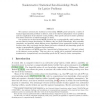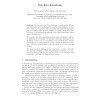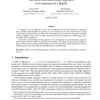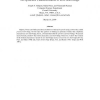152 search results - page 2 / 31 » Complex Zero-Knowledge Proofs of Knowledge Are Easy to Use |
123
Voted
CRYPTO
2008
Springer
15 years 3 months ago
2008
Springer
We construct noninteractive statistical zero-knowledge (NISZK) proof systems for a variety of standard approximation problems on lattices, such as the shortest independent vectors...
103
Voted
TCC
2005
Springer
15 years 7 months ago
2005
Springer
Abstract. We introduce Fair Zero-Knowledge, a multi-verifier ZK system where every proof is guaranteed to be “zero-knowledge for all verifiers.” That is, if an honest verifi...
110
Voted
EUROCRYPT
2008
Springer
15 years 3 months ago
2008
Springer
A shuffle of a set of ciphertexts is a new set of ciphertexts with the same plaintexts in permuted order. Shuffles of homomorphic encryptions are a key component in mix-nets, whic...
130
click to vote
CRYPTO
2000
Springer
15 years 6 months ago
2000
Springer
Abstract. We present a lower bound on the number of rounds required by Concurrent Zero-Knowledge proofs for languages in NP. It is shown that in the context of Concurrent Zero-Know...
123
Voted
TARK
2009
Springer
15 years 8 months ago
2009
Springer
Halpern, Moses and Tuttle presented a definition of interactive proofs using a notion they called practical knowledge, but left open the question of finding an epistemic formula...




